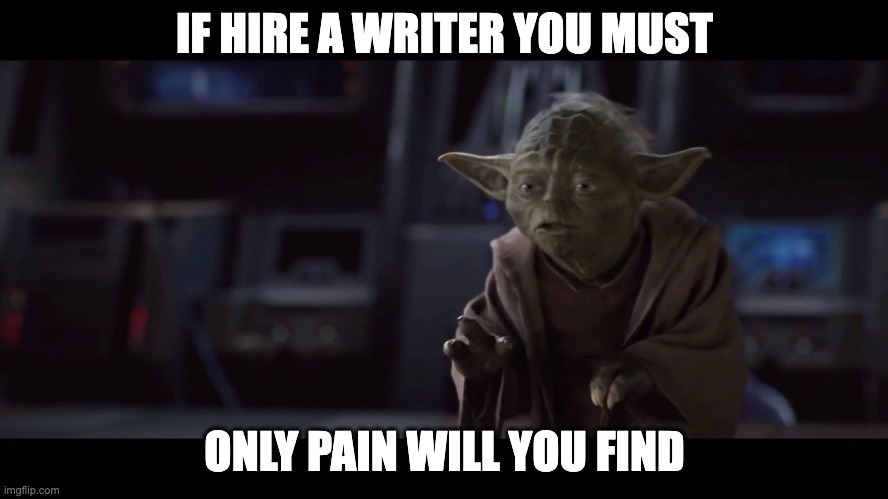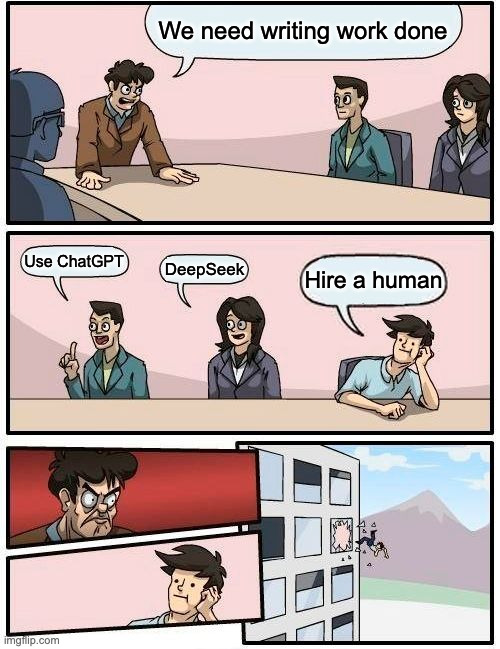Hiring writers: what you need to know
Find out what you need to know when hiring writers, whether freelancers or otherwise.
Adam Woodard
6 min read


If you find yourself needing to hire writers, knowing exactly what to look for and how to approach the process can help you find the right fit. Having an experienced writer or editor on-hand simplifies this process quite a bit, but you can still find what you need with some guidance. Having both been a writer myself (freelance and full-time) and recruited them, I’ve seen both sides of the process over the years. So, here’s what you need to know when hiring writers.
Do you need a writer?
I promise, this isn’t a fatuous question. Writing is a broad field of work with many specialisations and there are closely related roles like editor or proofreader. For example, two common types of writers you’ll encounter are copywriters and content writers, who produce copy and content respectively. Copy is writing that’s meant to convince the reader to take action, like landing pages, email marketing, and advertisements.
Content is meant to be informative and keeps the reader engaged by retaining their interest. This would include blog posts, articles, and guides. Writers can also specialise further, such as press release writers, grant writers, and social media writers. Just looking for a “writer” may help you find a good generalist, but if you’re looking for a specialist, it pays to know what to look for.
It's also worth pointing out, even if some writers don’t like to admit it, that people from other backgrounds make excellent writers. These include people with backgrounds in public relations, marketing, and even academia. A public relations specialist will likely do an excellent job managing the content and community of your social media pages. A marketer will know how to use written content (or copy) to get leads or drive sales. Someone with a solid academic background will know how to ensure your content is thoroughly researched.
Try casting a wider net depending on your specific needs, and you’ll probably find more options.
Freelancers versus employees
Looking for a freelance writer or an employee are quite different. You’ll want the same set of writing-related skills for either, but it’s their soft skills that will differ. When you work with a freelancer, you’re essentially offloading tasks onto them. They will often (but not always) need less direct supervision and require excellent communication and time management skills. Many dislike being regularly pestered by their clients, so you need to make sure they’ll get the work done.
This can be tricky to figure out, but you basically have two options. The first is to find a writer with considerable freelance experience. If they’ve produced significant amounts of work for reputable clients, odds are they know how to manage their own work. Repeated work with the same client shows they’re dependable, but one-off projects for lots of clients doesn’t necessarily convey the same reliability. Bear in mind that this becomes more relevant if you need ongoing work with strict deadlines.
If you just need a one-off project done, their portfolio is the best place to look. If they have accounts on sites like UpWork, you can also see what former clients have said about them.
The second option is to look for a less experienced or even new writer. I’d suggest taking this route if your budget doesn’t permit a more experienced writer or if you know what their work should look like (for example, where you could basically do the work yourself but need a writer due to time constraints). Newer writers should be much more communicative and responsive to feedback (and more tolerant of you pestering them). You may need to regularly check in on these writers to keep an eye on their work and progress. Trialling multiple newer writers and then choosing the best fit may save you time and money in the long run.
Hiring a full-time writer offers you the chance to take some time to get to know them before work starts (see the next section). That aside, the same general rules apply. Newer writers need more supervision and intervention but cost less, with the opposite being true for more experienced writers. If you intend to keep them long-term, you can overlook experience within your particular niche provided they can demonstrate adaptability. The best way to do this is to set them a task which mimics what they’d be doing if they got the job.
Skills versus personality
This section can apply to almost any hiring decision, but I’ll keep it specific to writers where possible. Simply put (and provided they meet a minimum threshold), it’s easier to teach someone new skills than to reconfigure their personality. The longer you intend the working relationship to be, the more important this becomes. A fantastic writer with a poor work ethic will be better on day one than a passable writer who’s very conscientious. But a year down the line, the conscientious writer’s skills will have improved, but the other will probably retain their poor work ethic.
Some of you reading this may be wondering what the aforementioned minimum threshold is. In a nutshell, they should be a natural communicator – both verbally and in writing. They should demonstrate a strong grasp of what you tell them and be able to repeat it in their own words. They should be attentive to detail and not make light of their own mistakes.
Now, this doesn’t necessarily mean a flawless or even native accent when speaking. Some of the best writers I’ve worked with spoke English as their second language with a strong accent, but their writing was nevertheless flawless. Try to focus on their words and how they convey their thoughts, rather than their accent or even their demeanour. Remember, a lot of writers are naturally quiet or even shy people.
How to budget for a writer
This section really only applies to hiring freelancers, as a full-time writer would have a salary. There are, broadly speaking, three ways to pay freelance writers: by word count, by project, or by hour.
Paying a freelancer hourly can raise concerns regarding their pace or how honest they are when it comes to billing. Unfortunately, there are always going to be people out there who deliberately slow their pace to get paid more. So, we’re back on the topic of work ethic. If, for whatever reason, you have concerns in this regard, I’d suggest avoiding an hourly rate altogether. This is especially true for newer writers with little or no track record, and who would likely write slower anyway. There are ways to track writers’ output using software, but many find this intrusive.
But, if you trust the writer, this approach can be best for differentiating between difficult and easy work. This is because easy work typically takes less time to complete, regardless of word count. An example of this would be if the writer needs to perform research prior to writing and how easily available the information is.
Now, word count versus project depends on the writing itself. If you want a writer to produce roughly the same types of work, then paying by project can take a lot of the guesswork away. For instance, you may want a writer to produce 800-word blog posts and 280-character social media posts. Set the expected ranges and fix the price for each, preferably with a schedule. That way, you both know what to expect.
Paying by word count can be a better option if you don’t know how long the final product will be or if you want a writer to produce work of differing lengths. You can set a rate per word or per page, with one page usually being between 250 and 300 words. Word counts almost always vary a little, so leaving a margin can help (either a percentage or word count). The greater the final word count, the smaller the percentage can be, but the larger an absolute word count margin can be.
For example, if the expected word count is 1,000 (i.e. four pages), then the range could be between 900 and 1,100 words, which would still count as four pages when invoicing. These are just examples, so find what works for you and the writer. It’s also a good idea to agree on an acceptable number of revisions per piece of work. So, three revisions would mean you can ask the writer to change or redo the work up to three times without paying them extra. Tracking the number of revisions you ask for over time is also a great way of checking how responsive they are.
Writers of all sorts can be peculiar creatures, with an occasionally inordinate attachment to their work. The most important thing to remember is that you need to find the right tool for the job, not just the most polished. An unpolished hammer is still a better tool for driving in a nail than a polished screwdriver.


